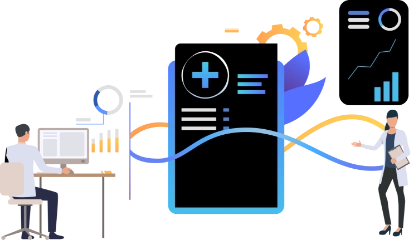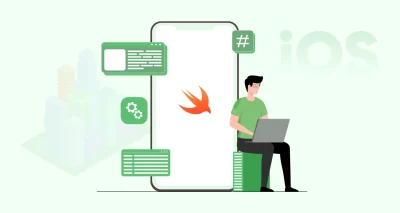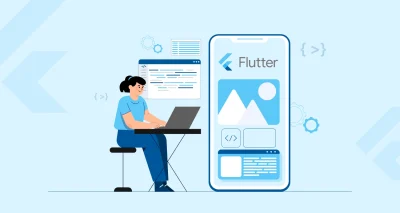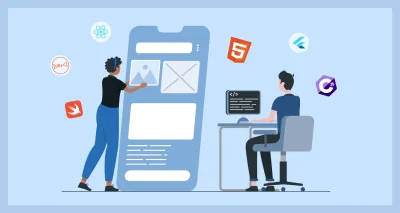

Navigating through the dynamic tides of the insurance industry, CMARIX shines as a vanguard of innovation, specializing in insurance software development. We're committed to simplifying insurance processes, enhancing accessibility, and elevating the overall experience for both providers and policyholders. Spanning from the nuanced realm of health insurance to comprehensive insurance software solutions, every piece of our software is crafted with precision and empathy towards user needs. Our expertise in custom insurance software development focuses on overcoming key challenges like data integration, regulatory compliance, and real-time processing.
Inquire NowSoftware Development
CMARIX is redefining the insurance industry with advanced software solutions that cater to the specific needs of today’s digital-first customers. By integrating our tech expertise with your insurance business acumen, we create software that not only streamlines operations but also delivers a superior customer experience.
Our policy management software is engineered to simplify the administration of insurance policies, providing seamless experiences for insurers and policyholders alike. With a focus on automation and user-friendly interfaces, managing the lifecycle of policies has never been more efficient.
Dive deep into data and emerge with insights with our Fraud Analysis Software, your new sentinel in the fight against fraudulent claims. CMARIX deploys advanced algorithms that sniff out irregular patterns and alert you to potential risks, safeguarding your operations and your clientele.
Software Solutions
At CMARIX, we're reengineering the insurance sector with bespoke software solutions that optimize and streamline operations for insurance companies. With a focus on innovation and user experience, we're crafting platforms that not only meet but exceed the expectations of the modern insurance landscape.
Crafting tailored software solutions that cater to the diverse needs of the insurance industry, CMARIX ensures that your insurance firm is equipped with the tools for success in a digital-first world. From policy management to claims processing, our solutions are robust and reliable.
Revitalize your existing insurance systems with our modernization services. We update legacy systems to enhance functionality and user experience, ensuring your software meets current standards of security, usability, and interoperability.
Designing intuitive and engaging interfaces, CMARIX prioritizes the user journey in every insurance software solution. Our prototyping process brings ideas to life, ensuring that the end product is both aesthetically pleasing and functionally seamless.
We bridge the gap between your insurance software and essential third-party systems. Whether it's integrating with finance software, CRM, or healthcare platforms, our solutions create a cohesive ecosystem for all your insurance operations.
Developing comprehensive web platforms for the insurance industry, our web solutions offer a seamless online experience for both insurance providers and their clients, ensuring all interactions are secure, efficient, and user-friendly.
With the rise of mobile, CMARIX provides insurance app development services that deliver convenience and functionality to the palms of your users. Our apps are designed to enhance the accessibility of insurance services on the go.
Do You Dare to Bring about Change With New Ideas?
Let's Craft Your Insurance Software Solutions Together.
Advanced Tech solutions
At CMARIX, we're not just developing software; we're crafting the digital backbone of tomorrow's insurance industry. Our bespoke solutions are meticulously designed to elevate your insurance business with the power of emerging technologies.
Imagine a world where your insurance offerings are as dynamic as the lives they protect. CMARIX is turning this vision into reality with IoT-driven insurance solutions. Our technology captures real-time data from connected devices, offering insurers unprecedented insights into risk management and policy customization. IoT empowers proactive approaches to policyholder safety and property protection, paving the way for personalized insurance experiences and more accurate pricing models.
Read MoreAI isn't just futuristic—it's now, and it's reshaping how insurance companies interact with data and clients. CMARIX harnesses the cerebral might of machine learning and artificial intelligence to automate claims processing, enabling predictive analytics that foresee trends and patterns in insurance needs. Our AI solutions include intelligent chatbots that provide 24/7 customer service, and machine learning algorithms that transform vast data sets into actionable insights, driving efficiency and customer satisfaction.
Read MoreIn the insurance sector, trust is paramount. Blockchain technology is the cornerstone of that trust in the digital age. CMARIX is at the forefront of incorporating blockchain into insurance solutions, creating immutable and transparent records for claims and policy management. By integrating smart contracts, we're streamlining operations, reducing the potential for fraud, and enhancing the overall security of transactions, all while maintaining strict regulatory compliance and simplifying the customer claims process.
Read MoreCloud computing is the horizon of limitless potential for the insurance industry, and CMARIX is your guide. We leverage cloud technology to provide scalable, agile, and secure platforms that adapt to the fluctuating demands of the insurance market. Our cloud solutions ensure that your data is accessible yet secure, operations are resilient, and collaboration is effortless, whether you're managing vast policy databases or enabling remote workforces.
Efficiency is the heartbeat of successful insurance operations. CMARIX's operations support software is the pulse that keeps it beating. We deliver comprehensive workflow solutions that automate routine tasks, synchronize departmental functions, and track operational metrics. This frees up your team to focus on what they do best—innovating insurance products and enhancing customer relationships.
In a data-rich industry like insurance, insight is everything. CMARIX's big data analytics dive deep into the data pool, emerging with pearls of wisdom that inform strategic decision-making. We equip insurers with the tools to dissect complex data, revealing trends that inform product development, risk assessment, and customer acquisition strategies. Our analytics turn the overwhelming into the understandable, providing clarity and direction in a competitive landscape.
Quick Look
Why Choose
In the digital constellation of insurance software development, CMARIX shines the brightest, offering unparalleled expertise and dedication to catapult your insurance business into the future.

Partner with us
Experience the pinnacle of digital transformation in the insurance industry with CMARIX, where we blend cutting-edge technology with deep insurance expertise to create software that propels your business forward.
Take control of your insurance policies with precision and ease, ensuring policyholder satisfaction and operational excellence.
All about our
Take a look at
Following are few of the many different types of custom Insurance Softwares developed by CMARIX across Insurance industries
Our insurance software solutions are designed to help insurance companies streamline their operations and improve efficiency. Our services involve providing the technology and tools to:
In essence, our services aim to make your insurance business run more efficiently through technology and data-driven insights, so you can focus on serving your customers and achieving your business goals.
You can find specialists for insurance software and app development through various channels. One option is to partner with a reputable software development company like CMARIX, which offers dedicated teams of experienced developers and experts in insurance technology. Other avenues include online platforms like freelance marketplaces, professional networking sites, and tech communities. Additionally, attending industry events and conferences can help you connect with potential specialists and learn more about their expertise. It's essential to thoroughly assess the qualifications, portfolio, and client reviews of candidates before making your decision to ensure you hire the right professionals for your insurance software project.
For an insurance company, developing and integrating an API (application programming interface) allows external developers and partners to connect with the company's systems and data. An API acts as an interface, allowing information to be requested and passed between different applications.
When an insurance API is developed, it typically exposes key data and functions related to:
An insurance API allows:
By developing and integrating an API, an insurance company can expose the data and services needed to power digital transformations, create new revenue streams, and improve customer experience. The API acts as a bridge, connecting the insurer's systems to the outside world in a secure and controlled manner.
Insurance software refers to computer programs and applications that help insurance companies manage their business. It automates tasks, improves efficiency and customer service. Functions include:
Insurance software helps insurers automate tasks, reduce costs, gain insights from data and run their business more efficiently.
The cost to develop insurance software depends on several factors:
Costing for insurance software development depends on the exact project specifications. Once we receive the detailed project requirements we will be able to provide accurate time and cost estimation for its turnkey implementation.
Insurance risk management software helps insurers identify, analyze and mitigate risks. Developing this type of software involves building applications that can:
Key features include risk scoring, scenario modeling, fraud detection and predictive analytics. Technologies like AI, machine learning and algorithms power the software.
The goal is to give insurers a comprehensive, data-driven way to identify and manage the variety of risks they face to improve profitability, reduce losses and ensure compliance.
Insurance agency software provides tools to help agencies manage their day-to-day operations more efficiently. Core features often include:
The goal is to provide agencies with the tools needed to save time and work more efficiently, while also improving client service, boosting sales and retaining clients. This allows agencies to focus more on growth.
An API (Application Programming Interface) allows external developers to connect and interact with an insurance company's systems and data.
When an insurance company develops an API, it exposes key functions and data related to policy administration, underwriting, billing, claims and more.
Insurance API integration allows:
By developing and integrating an API, an insurance company can:
The API acts as a secure bridge, connecting the insurer's systems to the outside world in a controlled manner. This allows external developers to innovate and build on the insurer's data.
AI is significantly enhancing the efficiency and accuracy of the claim processing system in insurance. By automating document verification, AI instantly scans and verifies claim documents, reducing the need for prolonged manual checks and speeding up approvals. Another significant advantage is fraud detection. By analyzing past claims data, AI identifies anomalies in current submissions, acting as a shield against potentially fraudulent claims. Predictive analysis, powered by AI, allows insurers to anticipate and allocate resources by forecasting future claim scenarios based on historical data.
Furthermore, the advent of AI-powered chatbots provides real-time assistance to claimants, simplifying the claim submission process and answering queries instantly. In scenarios involving damage claims, such as in auto insurance, AI's ability to analyze images offers a quick assessment of the extent of damage and an estimate of repair costs. Using Natural Language Processing, AI effectively processes claim descriptions by understanding human language, thus extracting essential information to aid the claim decision. Lastly, the integration of AI with IoT devices like car telematics provides real-time data during accidents, facilitating swift claim initiation and accurate damage assessment. Overall, AI's integration is ensuring a more responsive, data-driven, and customer-centric claim processing system in insurance.
Do you have more questions?



Contact Us
Have questions about your idea? Drop in your details to discuss with our solution consultants. We look forward to hear from you.